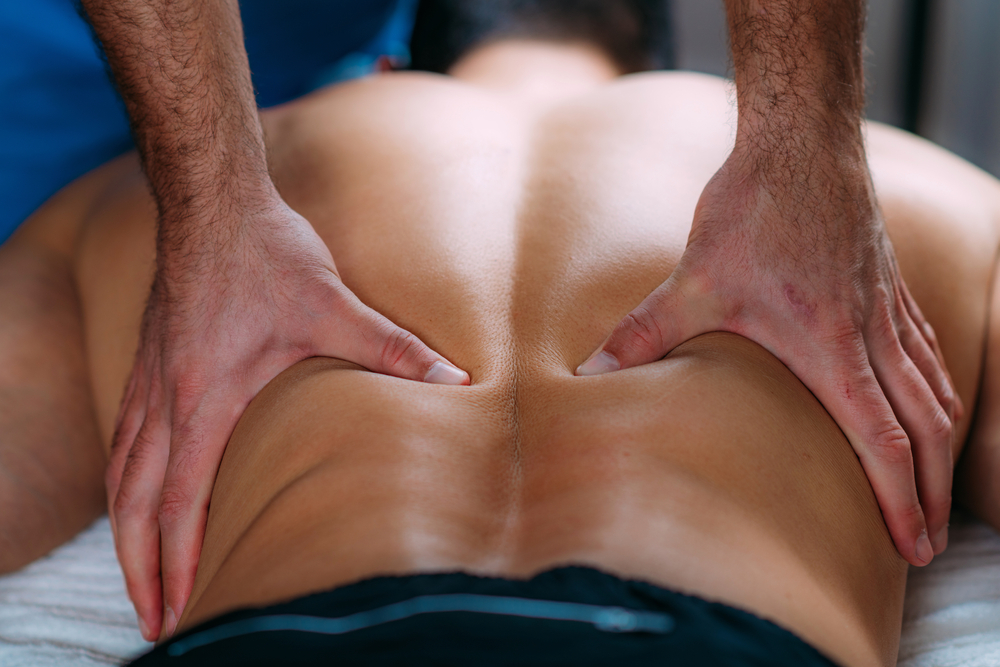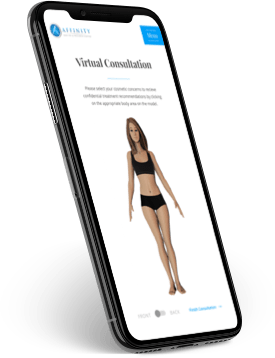Transform Your Health with Massage Therapy
Massage therapy is a form of integrative medicine that involves the gentle manipulation of the soft tissues of the body, including muscle, connective tissue, tendons, and ligaments. Massage therapy can be used as a standalone treatment or in conjunction with other types of medical care to expedite recovery and improve results.
Therapeutic massage has been used for centuries to reduce stress, relieve muscle tension and pain, and promote overall health and well-being. Affinity Regen Med & Wellness Center in Waterford Lakes, Orlando, offers a variety of Massage Therapy techniques, including Swedish and deep tissue massage, as well as trigger point therapy and myofascial release. By integrating long-standing techniques like Massage Therapy into our regenerative medicine protocols, we can help improve outcomes and deliver sustainable results in pain relief and management. Our award-winning team of medical experts, board-certified professionals, and licensed massage therapists includes some of the country’s top leaders in regenerative medicine, and with their 157+ years of combined experience, you can be confident you’re receiving the customized care you deserve to help you feel better in your body.
Massage Therapy for Pain Management and Relief
Massage therapy helps relieve and reduce pain by interrupting the pain cycle of sensory signals sent between the brain and areas of the body.
The pain cycle is triggered by a reflex reaction that stimulates the muscle tissue around an injury as a way of providing support. However, as the muscles tighten, this stimulation restricts blood flow to the area, resulting in more damage, pain, and inflammation. Massage therapy stimulates large nerve fibers near the skin’s surface and disrupts the pain signals being sent to the brain.
It also helps with pain relief and management through:
- Hormone release. Massage therapy has been shown to reduce stress-related hormones like norepinephrine and cortisol and increase levels of endorphins like dopamine and serotonin, producing improvements in mood regulation and pain sensitivity.
- Improved lymphatic and blood circulation. Through the stimulation of the skin and muscles and by increasing body temperature, massage therapy increases blood flow throughout the body to deliver more oxygen and nutrients to damaged or inflamed muscle fibers, reducing pain, inflammation, and tension, and promoting better healing.
- Reduced swelling and water retention. By stimulating the soft tissues, massage therapy helps reduce the collection of fluids in swollen joints and helps improve the removal of tissue waste carried by the body’s lymph system.
- Relieving nerve pain. Tight muscles put pressure on nearby nerves, causing pain, tingling, and numbness. In releasing muscle tension and relaxing the muscles, massage therapy helps reduce associated nerve pain.
- Improved flexibility and range of motion. Loosening and relaxing tense muscles through heat and soft tissue stimulation can help reduce pain, relieve stiffness in the joints, and make it easier and more comfortable for you to move.
- Reduced inflammation. Inflammation is your body’s immune system response to anything from bacterial infections to damaged tissue. Chronic pain and autoimmune conditions are often the result of your body producing an inflammatory response when it doesn’t need to, but massage therapy can help interrupt that process and reduce inflammation.

Massage Therapy for More Complete and Integrative Care
Massage Therapy for pain relief and management can be combined with other therapeutic options offered at Affinity Regen Med & Wellness Center—such as Chiropractic services, Prolotherapy, and PRP Therapy with Stem Cells—for better, faster, and longer-lasting results than treatments like steroid injections or medications.
At Affinity Regen Med & Wellness Center, we offer the following massage techniques:
Swedish massage
A therapist uses moderate and relaxed pressure in kneading and circular motions to ease overall muscle tension, soreness, circulatory issues, and stress. It is ideal for general relaxation, improving muscle efficacy, and alleviating mild pain.
Prenatal massage
In addition to relieving neck, back, and shoulder pain experienced during pregnancy, prenatal massage—using techniques like Swedish massage—can also help reduce swelling, tension, stress, and anxiety; ease insomnia, headaches and nausea; and improve sciatic nerve pain.
Hot stone massage
This form of heat therapy uses hot stones placed strategically over sore, painful, or tight areas of the body to reduce tension and increase blood flow. The stones may also be moved in kneading, stroking, or circular movements across the body. It can be used alone or in conjunction with another massage technique to make knots or achy muscles easier to work.
Deep tissue massage
Using slow, deep strokes and more intense pressure, deep tissue massage targets the deeper layers of muscle and connective tissue to break down scar tissue, reduce muscle tension, and relieve chronic pain. It is ideal for enhancing rehabilitation after an injury, improving range of motion, and releasing muscle knots and trigger points.
Specific types of deep tissue massage include:
Myofascial release
This is a slow and gentle stretching technique that helps relieve tension and restricted mobility resulting from scarred, hardened, or injured fascia, the connective cushioning tissue that protects and connects muscles, bones, ligaments, and tendons. Because this method helps increase the flexibility of fascia tissue, it is used for a range of soft tissue problems and musculoskeletal conditions in areas like the back, hamstrings, legs, arms, and feet.
Trigger point therapy
This massage technique applies deep, deliberate pressure to specific areas of pain called trigger points, temporarily blocking the blood flow to that area so that, upon release, the body produces an inflammatory response and resumes the healing process.
Maximize Your Healing with Massage Therapy from Affinity Regen Med & Wellness Center
There is both a science and an art to health and wellness, and true healing comes from tailored therapies that are designed to help your body function and feel better from the inside out. At Affinity Regen Med & Wellness Center, our team of experts, specialists, and certified massage therapists integrate the best in advanced regenerative therapies with proven, trusted modalities like Massage Therapy to address your pain at the source instead of only focusing on your symptoms.
At Affinity Regen Med & Wellness Center, pain relief and management methods like Massage Therapy aren’t trends; they’re safe, effective, and well-supported methods for helping your body recover and rejuvenate. With extensive knowledge in total-body wellness and expert skill and training in a broad array of therapies, Affinity Regen Med & Wellness has helped thousands of patients return to their optimal level of mobility after auto injuries, joint pain, sports injuries, osteoarthritis, and more, and we can help you to.
We know healing is unique to every person, and we’re here to help find the right regenerative medicine for your body. Call to schedule your consultation today.
Massage Therapy Q & A
- How often should I get a massage?
-
Every person and every body is different, so the frequency of your massage therapy sessions will be highly individualized to your unique needs and goals. For some people, a “general tune-up” every 4-6 weeks is good, but chronic conditions or specific areas of strain or pain may benefit from a massage every 1-3 weeks.
- What conditions can massage therapy be used to treat?
-
Because of the host of physical, physiological, and psychological benefits associated with it, massage therapy can be used either alone or as a complementary modality to other therapies to help effectively manage conditions like:
- Autoimmune diseases
- Chronic headaches
- Depression
- Digestive problems
- Exercise-related injuries
- Fatigue
- Fibromyalgia
- Insomnia
- Lymphedema
- Low back pain
- Muscle spasms
- Multiple sclerosis
- Osteoarthritis
- Post-surgery pain (after six weeks after surgery unless approved by a doctor)
- Repetitive stress injuries
- Sciatica
- Sports injuries


